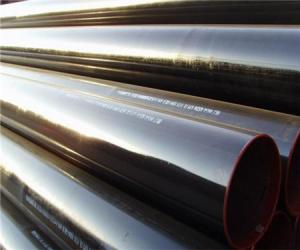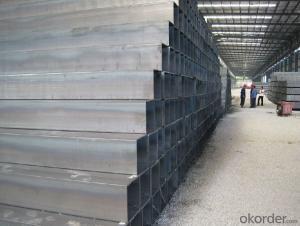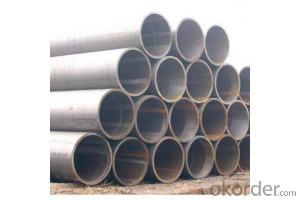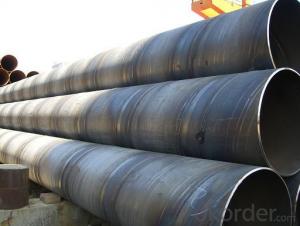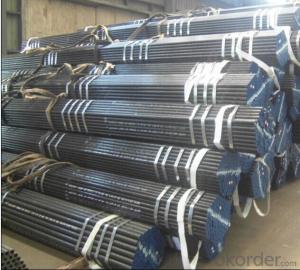API 5L SSAW Carbon Steel Welded Construction Steel Pipe
- Loading Port:
- Tianjin
- Payment Terms:
- TT or LC
- Min Order Qty:
- 20 m.t.
- Supply Capability:
- 15000 m.t./month
OKorder Service Pledge
OKorder Financial Service
You Might Also Like
1、Structure of API 5L SSAW Carbon Steel Welded Construction Steel Pipe:
ERW steel pipe is electric resistance welding, the abbreviation for ERW for transporting oil and natural gas vapor liquid objects, can meet the requirements of high and low pressure, the transport in the world with pipe sector accounted for a pivotal position.
2、Main Features of API 5L SSAW Carbon Steel Welded Construction Steel Pipe:
• High manufacturing accuracy
• High strength
• Good visual effect
• Reasonable price
• Small inertia resistance
• Strong heat dissipation ability
3、API 5L SSAW Carbon Steel Welded Construction Steel Pipe Specification:
Standard | GB, DIN, ASTM ASTM A106-2006, ASTM A53-2007 |
Grade | 10#-45#, 16Mn 10#, 20#, 45#, 16Mn |
Thickness | 1 - 33 mm |
Section Shape | Round |
Outer Diameter | 21 - 610mm |
Place of Origin | Tianjin, China (Mainland) |
Secondary Or Not | Non-secondary |
Application | Hydraulic Pipe |
Technique | Cold Drawn |
Certification | API |
Surface Treatment | factory state or painted black |
Special Pipe | API Pipe |
Alloy Or Not | Non-alloy |
Length | 5-12M |
Outer Diameter | 21.3-610mm |
Grade | 20#, 45#, Q345, API J55, API K55, API L80, API N80, API P110, A53B |
Standard | ASME, ASTM |
1) Material:20#(ASTM A 106/A53 GRB.API5LGRB,GB),45#,16Mn,10#.
2) Specification range:OD:21.3-610mm,WT:6-70mm,length:6-12m or according to the requirement of clients.
3) Excutive standards:GB,ASME API5L.ASTM A 106/A53,Despite of the above standards,we can also supply seamless steel pipe with standard of DIN,JIS,and so on,and also develop new products according to the requirements of our clients!
4) Surface:black lacquered,varnish coating or galvanized.
5) Ends:Beveled or square cut,plastic capped,painted.
6) Packing:bundles wrapped with strong steel strip,seaworthy packing.
4、Packaging & Delivery
Packaging Details: | seaworthy package,bundles wrapped with strong steel strip |
Delivery Detail: | 15-30days after received 30%TT |
5、FAQ of API 5L SSAW Carbon Steel Welded Construction Steel Pipe:
①How is the quality of your products?
Our products are manufactured strictly according to national and internaional standard, and we take a test
on every pipe before delivered out. If you want see our quality certifications and all kinds of testing report, please just ask us for it.
Guaranteed: If products’ quality don’t accord to discription as we give or the promise before you place order, we promise 100% refund.
②How about price?
Yes, we are factory and be able to give you lowest price below market one, and we have a policy that “ for saving time and absolutely honest business attitude, we quote as lowest as possible for any customer, and discount can be given according to quantity”,if you like bargain and factory price is not low enough as you think, just don’t waste your time.Please trust the quotation we would give you, it is professional one.
③Why should you chose us?
Chose happens because of quality, then price, We can give you both.Additionally, we can also offer professional products inquiry, products knowledge train(for agents), smooth goods delivery, exellent customer solution proposals.Our service formula: good quality+good price+good service=customer’s trust
SGS test is available, customer inspection before shipping is welcome, third party inspection is no problem.
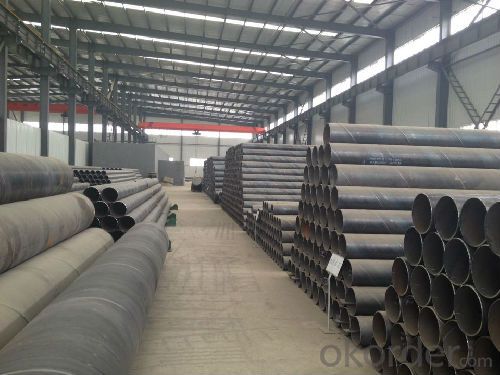
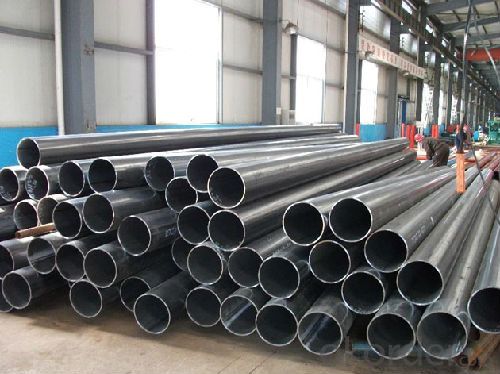
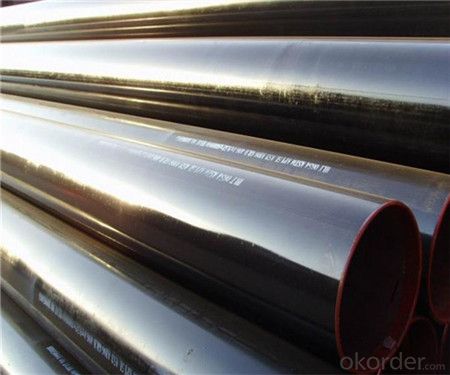
- Q: What is the difference between steel pipes and PPR pipes?
- Steel pipes and PPR (Polypropylene Random Copolymer) pipes are two different types of pipes commonly used in various industries and applications. The main difference lies in their material composition and properties. Steel pipes are made from steel, a strong and durable metal. They are known for their high tensile strength, resistance to extreme temperatures, and ability to withstand high pressure. Steel pipes are commonly used for transporting fluids and gases in industries such as oil and gas, construction, and plumbing. On the other hand, PPR pipes are made from a type of plastic called polypropylene random copolymer. PPR pipes are known for their excellent thermal and chemical resistance, as well as their light weight and easy installation. They are commonly used for hot and cold water supply systems, as well as in heating and cooling applications. In summary, the key difference between steel pipes and PPR pipes lies in their material composition and properties. Steel pipes are stronger and more suitable for high-pressure and extreme temperature applications, while PPR pipes are lighter, easier to install, and ideal for water supply systems.
- Q: What is the tensile strength of steel pipes?
- The tensile strength of steel pipes can vary depending on the grade and type of steel used. However, on average, steel pipes typically have a tensile strength ranging from 300 to 700 megapascals (MPa).
- Q: How are steel pipes used in petrochemical plants?
- Steel pipes are extensively used in petrochemical plants for various applications such as transporting fluids, gases, and chemicals. These pipes are commonly used for the transfer of raw materials, intermediates, and finished products within the plant. They are also utilized for process lines, cooling systems, and as structural components in petrochemical plants. The durable and corrosion-resistant nature of steel makes it an ideal choice for withstanding the harsh conditions and high-pressure environments typically found in these facilities.
- Q: How are steel pipes resistant to corrosion?
- The corrosion resistance of steel pipes is a result of several factors. Firstly, a protective layer, such as zinc or epoxy, is often applied to steel pipes. This layer acts as a barrier, preventing moisture and corrosive substances from reaching the steel and reducing the likelihood of corrosion. In addition, the composition of steel itself contributes to its resistance to corrosion. Steel is primarily composed of iron, with small amounts of other elements added to enhance its strength and durability. These additional elements, like chromium and nickel, create a natural oxide layer on the surface of the steel. This oxide layer acts as a protective shield, preventing moisture and oxygen from reaching the steel and causing corrosion. Furthermore, steel pipes can undergo a process called galvanization, where a layer of zinc is applied to the surface. This zinc coating provides an extra layer of protection against corrosion, as zinc is highly resistant to rust and oxidation. The zinc layer corrodes sacrificially instead of the steel, thereby extending the lifespan of the pipe. Overall, the combination of protective coatings, the composition of steel, and galvanization processes all contribute to the corrosion resistance of steel pipes. As a result, they are highly durable and suitable for a variety of applications, including plumbing, construction, and the transportation of fluids and gases.
- Q: Can steel pipes be used for hydraulic systems?
- Yes, steel pipes can be used for hydraulic systems. Steel pipes are commonly used in hydraulic systems due to their high strength, durability, and resistance to high pressure and temperature. They provide reliable performance and are suitable for a wide range of hydraulic applications.
- Q: What is the difference between hot-dipped galvanized and electro-galvanized steel pipes?
- Hot-dipped galvanized and electro-galvanized steel pipes are both types of steel pipes that have undergone a galvanization process to protect them from corrosion. However, there are some key differences between the two processes. Hot-dipped galvanized steel pipes are immersed in a molten zinc bath, which results in a thick coating of zinc being applied to the surface of the steel. This process creates a durable and long-lasting corrosion-resistant barrier. The thickness of the zinc coating can vary, but it is generally thicker than that of electro-galvanized steel pipes. On the other hand, electro-galvanized steel pipes are coated with a thin layer of zinc using an electroplating process. This process involves passing an electric current through the steel pipes while they are immersed in a zinc solution. The zinc particles are then deposited onto the surface of the steel, creating a thin and uniform protective barrier. One of the main differences between these two processes is the thickness of the zinc coating. Hot-dipped galvanized steel pipes have a thicker and more robust coating, making them more suitable for applications in harsh environments or where the pipes will be exposed to corrosive substances. Another difference is the appearance of the pipes. Hot-dipped galvanized steel pipes typically have a dull grayish finish, while electro-galvanized steel pipes have a smoother and more polished appearance. In terms of cost, electro-galvanized steel pipes are generally more economical compared to hot-dipped galvanized steel pipes. This is because the electroplating process is less labor-intensive and requires less zinc. Overall, the choice between hot-dipped galvanized and electro-galvanized steel pipes depends on the specific application and the level of corrosion resistance required. Hot-dipped galvanized steel pipes are typically used in more demanding environments, while electro-galvanized steel pipes are suitable for less corrosive applications where cost-efficiency is a priority.
- Q: What are the dimensions of steel pipes?
- Steel pipes can have varying dimensions depending on specific requirements and industry standards. However, they generally adhere to standardized measurements for their outer diameter (OD), wall thickness, and length. The OD of steel pipes can range from small sizes, such as ¼ inch (6.35 mm) or ⅛ inch (3.175 mm), to larger sizes like 48 inches (1219.2 mm) or more for specialty applications. The wall thickness of steel pipes can also vary significantly, ranging from thin pipes with a few millimeters of thickness to thick pipes with several inches of thickness. Regarding length, standard steel pipes are typically produced in lengths of 20 feet (6.1 meters) or 40 feet (12.2 meters). However, custom lengths can also be manufactured to meet specific project requirements. It is important to note that these dimensions are only general examples and may not encompass all potential variations in steel pipe sizes. Therefore, consulting relevant industry standards and specifications is always recommended to determine the precise dimensions necessary for a specific application.
- Q: Can steel pipes be used for irrigation pumps?
- Yes, steel pipes can be used for irrigation pumps. Steel pipes are commonly used in irrigation systems due to their durability, strength, and resistance to corrosion. They can handle the high pressures and flow rates required for efficient irrigation, making them a suitable choice for connecting and transporting water from irrigation pumps.
- Q: Can steel pipes be used for paper mills?
- Yes, steel pipes can be used for paper mills. Steel pipes are widely used in various industries, including paper mills, due to their durability, strength, and resistance to corrosion. These pipes are commonly used for transporting water, chemicals, steam, and other fluids within the paper mill facilities.
- Q: How are steel pipes protected against corrosion in marine environments?
- Steel pipes are protected against corrosion in marine environments through various methods, including the use of protective coatings, cathodic protection systems, and selecting corrosion-resistant materials.
Send your message to us
API 5L SSAW Carbon Steel Welded Construction Steel Pipe
- Loading Port:
- Tianjin
- Payment Terms:
- TT or LC
- Min Order Qty:
- 20 m.t.
- Supply Capability:
- 15000 m.t./month
OKorder Service Pledge
OKorder Financial Service
Similar products
Hot products
Hot Searches
Related keywords
